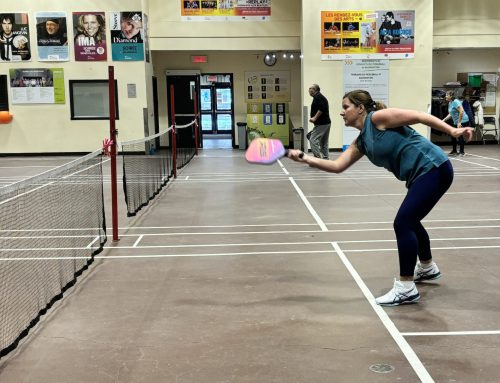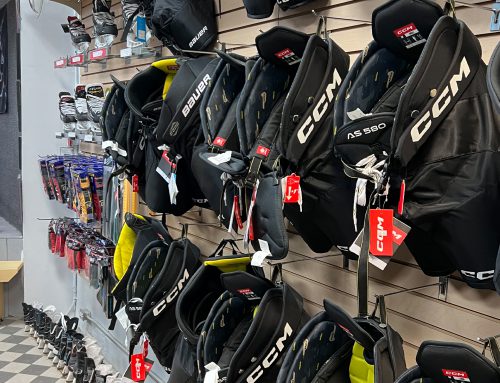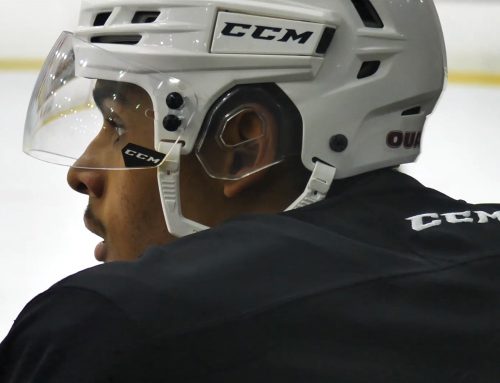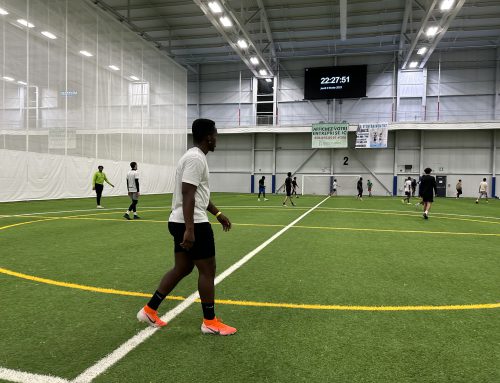BY Anthony Issa & Dami Akintade
Fatima Ahmad has been victim to many instances of Islamophobia over the past five years. So, she took a feminist self-defence course at the Khadijah Islamic Center.
Prior to taking the course, a man violently removed her face veil in public.
“The first time this happened I was shocked, and completely frozen in the situation,” says Ahmad. “This was the second time this happened to me and I knew this wouldn’t be the last time I would be targeted. So when I learnt that there was a self-defence class being offered, I decided to take it.”
Through the course, she began learning physical defence techniques and how to maintain a more assertive presence in the face of authority.
“I enjoy doing physical activities, but the self-defence class made me feel more confident about my abilities and how to protect myself,” she says. She also feels better equipped to protect herself against misogynistic and islamophobic attacks by men.
“I have more knowledge and more power in what I can do in these situations,” she says. “These attacks still affect me, but I know now to trust my instincts, be loud and maintain confidence. When things like this happen, I’m ready to act.”
In 2020, she faced another Islamophobic attack. With her newfound acquired knowledge she was able to follow her instincts and stand up for herself.
“Because I was looking at my phone, I wasn’t paying much attention to what was happening around me. I did manage to call the police much later and the man was arrested,” she says.
The third time another man tried to pull on her hijab, Ahmad reacted immediately. She recorded a video of the person, called the police, and had bystanders helping her.
“I think I am more confident and with these kinds of situations now that I have taken the course,” says Ahmad.
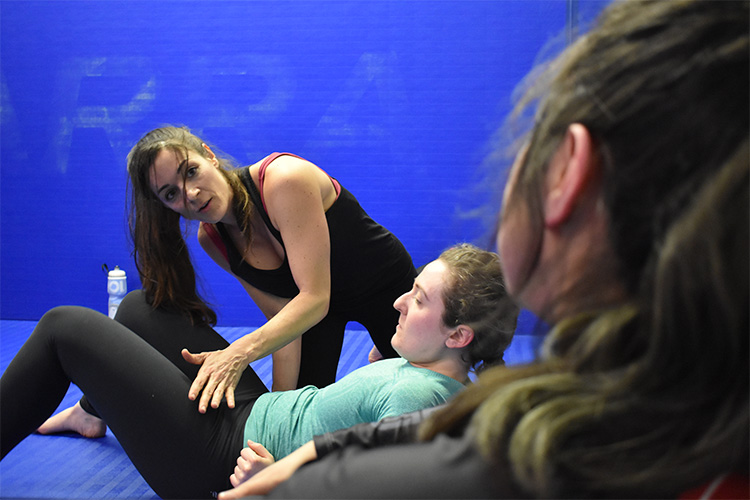
A group of women learning Brazilian Jiu-Jitsu techniques during a self-defence class at Gracie Barra Montreal-Ouest. Photo by Anthony Issa.
Reports of Femicides have remained high in Canada since 2020. Based on data by Canadian Femicide Observatory for justice and Accountability (CFOJA), 24 women and girls were murdered in Quebec in 2022. There were 26 femicides in 2021. The CFOJA says that both years likely had higher death counts than what was reported.
Bill Goble is a violence prevention instructor who teaches women self-defence classes at the charity group Strong Orange. He is the coach who taught Ahmad self-defence techniques. He explains that almost 80 per cent of cases of violence against women are caused by a known person.
“This can range from an intimate partner, a family member, whatever. It’s somebody that’s known. So the idea of a bad guy jumping out of a bush, that happens, but it’s not the vast majority of where the problem is,” he says.
The relationship between the victim and the accused was known in more than three quarters of murder cases involving women. In 52 per cent of cases, primary victims were current or former spouses of the accused, while the remaining cases involved other family members at 31 per cent, friends or acquaintances at nine per cent and strangers at eight per cent.
Goble says that physical training is only a small portion of feminist self-defence workshops with the majority of the time spent recognising predatory behaviours and social violence.
“With young women, there’s a lot of confusion about what consent is,” he says. “If a man asks to hold a woman’s hand consensually, does that also mean he’s entitled to putting his arms around her shoulders without asking? No it doesn’t. So consent has to be enthusiastic and ongoing. That sort of thing needs to be discussed.”
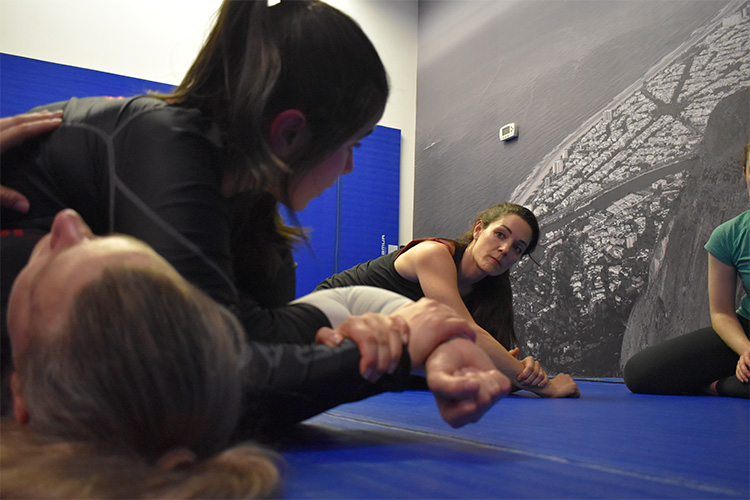
Self-defence coach Nathalie demonstrates a submission hold to the class. Photo by Anthony Issa.
Goble explains that it’s important to teach things that women can quickly adapt into their daily lives. Verbal and emotional communication is easier to pick up than highly technical mixed martial arts punches and throws.
“Sometimes I have chairs, or have participants on the floor and you’re sitting around in a circle,” he says. “All participants put their hand on the knee of the person to their left.”
The challenge is to get their hand off using an assertive demand or by forcing it off without asking the other person politely. The demo is designed to demonstrate that a person can assert authority over their own autonomy without escalating a situation violently.
The goal is to share tools, verbal and physical tools, to give women life tools so they can use them according to their needs to stop the escalation of any aggression.
“If you say, ‘get your hand the fuck off my knee!’, then the language escalates the situation. But if you say, ‘Get your hand off my knee!’ in a certain voice or push their hand away, those are all things which have the potential to work.” says Goble. “If you go, ‘Oh, please, would you take your hand off my knee?’, you’re not making a statement. It’s a question and it’s not as assertive.”
Additionally, some examples Goble shares of self-defence tactics that are easier to pick up quickly are poking eyes, punching the throat or hitting an aggressor’s knees, which are most effective in scenarios of confrontation.
Many women have also been registering to feminist self-defence classes according to the City of Montreal.
The interest in martial arts amongst women has increased in Montreal. Video by Dami Akintade.
Alerted by data revealed by a report the municipal government conducted on street harassment last September, the government felt the need to offer cis-gendered women and LGBTQ+ community members better tools to deal with harassment.
The city offers feminist self-defence workshops at different municipal libraries which is facilitated by Montreal Assault Prevention Center. In 2023, five workshops were held across different municipal libraries with 71 women registered for the courses so far. More workshops are planned.
A map of services, feminist self-defence classes and MMA courses available for women around the city. Map by Anthony Issa.
Women’s shelters, feminist groups, and religious centres are also holding feminist self-defence workshops in order to combat gender-based violence. Feminist self-defence is distinct from typical classes offered to survivors of gender-based violence. It aims to empower women rather than blame them for the harm caused by their aggressor.
Their training focuses on assertiveness, consent, de-escalation, and physical strategies to either injure the aggressor to escape a dangerous situation or avoid the situation in its entirety.
The Montreal Assault Prevention Center is one of the few institutions that offers a feminist self-defence course in the city, named ACTION. Beatriz Muñoz, the lead coordinator of ACTION, wants to demystify assault through the prevention strategies they teach in the course.
“The goal is to share tools, verbal and physical tools, to give women life tools so they can use them according to their needs to stop the escalation of any aggression,” says Muñoz. “We don’t have a protocol, and we don’t tell women how they should learn. No, our goal is to share the tools we have. The responsibility of the participants is to identify what is useful for them according to their personality, their strengths, their beliefs, and to use it to regain power.”
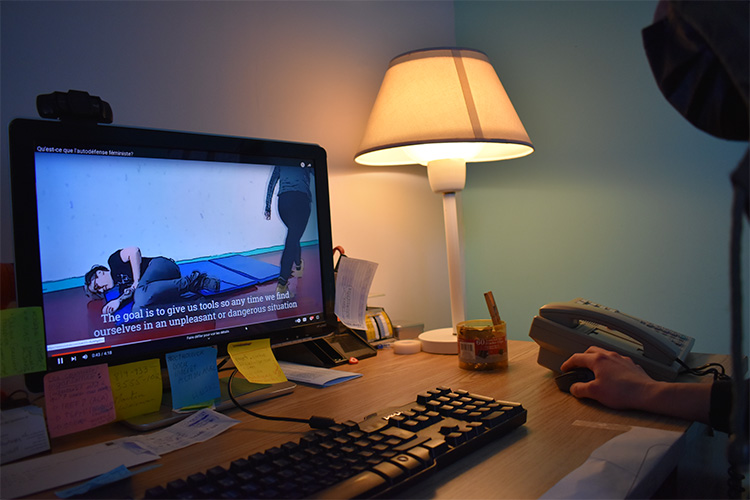
Worker at the Montreal Assault Prevention Centre watching a feminist self-defence tutorial video. Photo by Anthony Issa.
Muñoz explains that survivors of gender-based violence are often struck with a loss of control of their life after an assault and feel disempowered . The tools taught in the course are meant to let survivors regain control of their bodies, confidence and empowerment.
“I think that is the main difference between ACTION and other self-defence courses, because they don’t take the woman’s agency into consideration,” she says.
Their workshops typically begin by demystifying the approach used in regular self-defence classes which which outlines rules for women to follow in order to not experience sexual assault.
“For example, often we tell women not to go out at night, to carry a whistle, not to talk to strangers, or not to dress [in revealing clothing], not to go alone to a bar, all this stuff […] but the person who is responsible for the aggression is not the woman, it’s the aggressor,” says Muñoz.
She believes that this approach is problematic as it makes the women responsible for their aggression, and not the aggressor.
The workshop also aims to provide women with a sense of discovery, liberation and solidarity according to Muñoz . She says that being able to identify different types of assaults, avoid a dangerous situation before it happens, or for a survivor to understand they are not responsible for the harm caused to them can be a freeing experience for the members in the program.
“Some participants are freed from the guilt they feel from their assault, while other women can identify strength in their bodies and voices or even recognize ways they can stop an aggression. Until that moment, they weren’t aware of that,” says Muñoz.
The demographic of women who enrol in feminist defence classes varies in age, religious group, and cultural background.
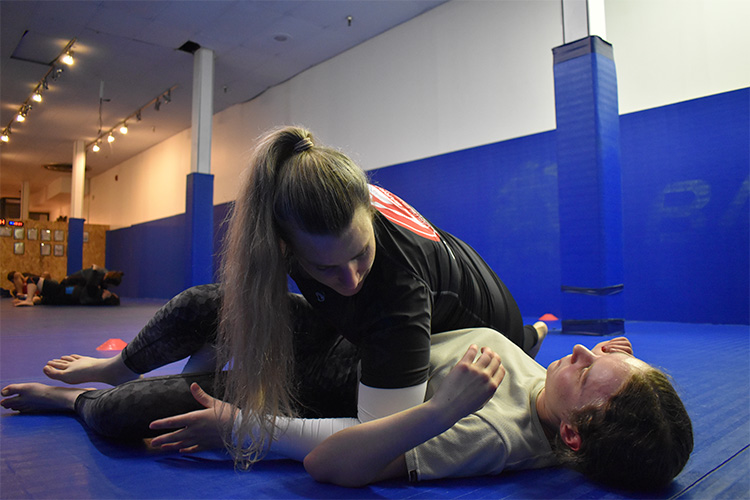
Classmates practising self-defence techniques. Photo by Anthony Issa.
According to Goble, women of marginalised backgrounds are the most susceptible to gender based violence. Due to being concerned about standing out publicly, often they take on a body language that makes them seem more subdued, which makes them a potential target for an aggressor.
“They might need more help in learning how to be assertive, or displaying awareness of their environment,” says Goble.
The program faces challenges including a staff shortage and limited funding. Also, recruiting more coaches is difficult because they prefer to hire people who have already taken the class or are familiar with the methodology and goals of their program.
“It’s a non-profit [model] and there’s not much money even with support from the government,” says Muñoz.
Most workshops cost $75 per session with a total of 90 hours of training, but Muñoz doesn’t want to rely on subscriptions to survive. Often they allow women to take the class at a discount, or even for free.
On their website, women share their success stories of what they have done to prevent aggressions.
“We share that in order to validate what women have done. Normally, we only hear stories about violence against women and their victimisation,” says Muñoz. “Sharing these stories creates an atmosphere of solidarity, empathy, and helps other survivors understand their situation and even answers certain questions for them[selves]. It’s beautiful.”

